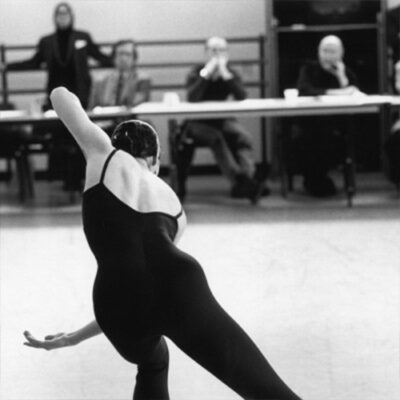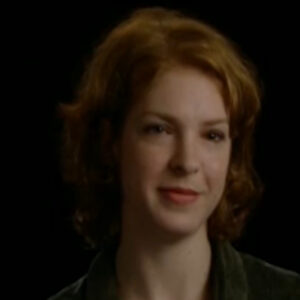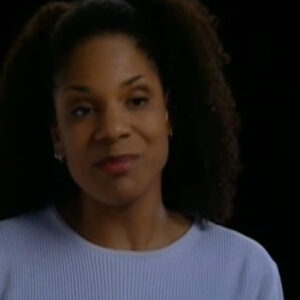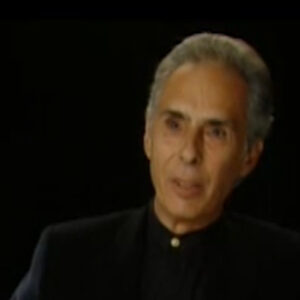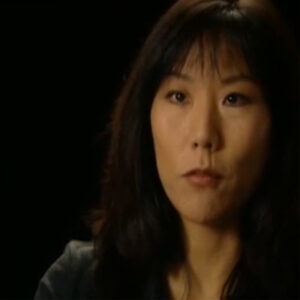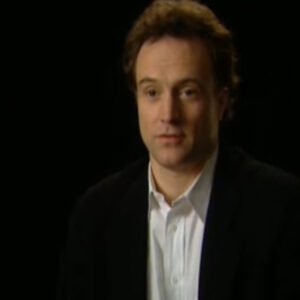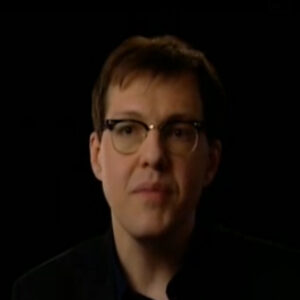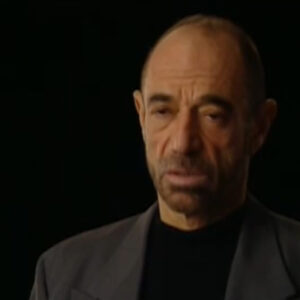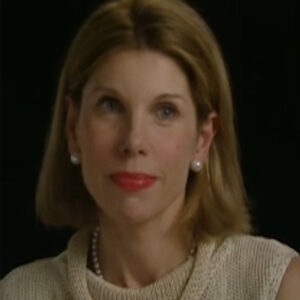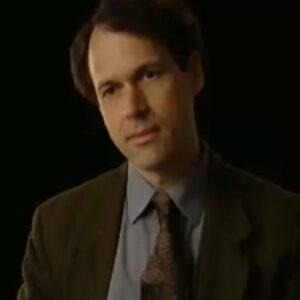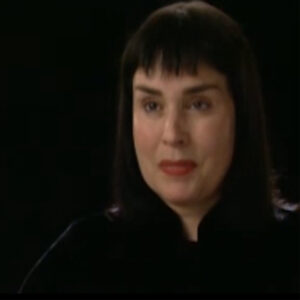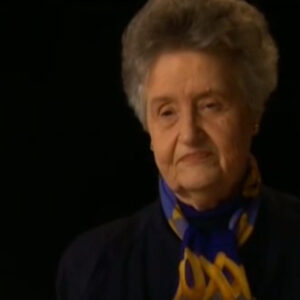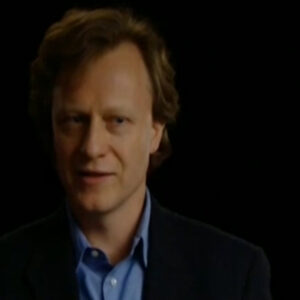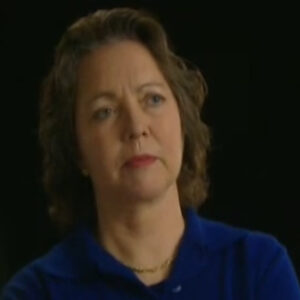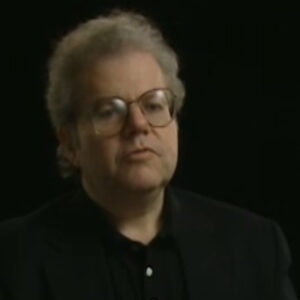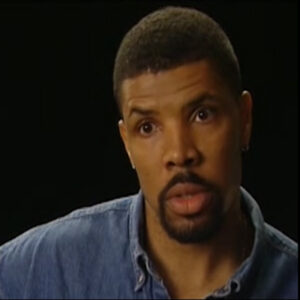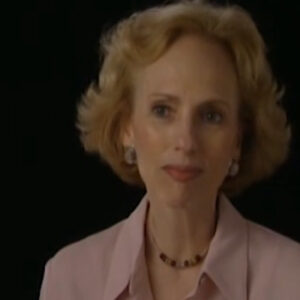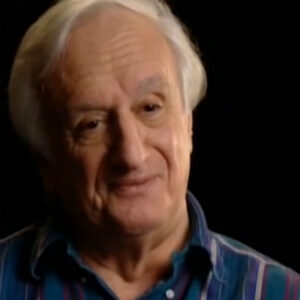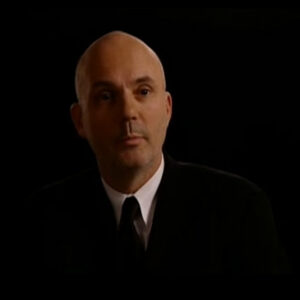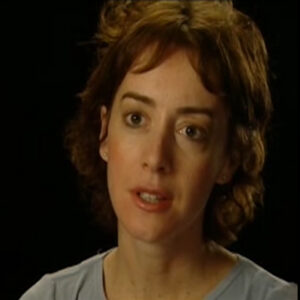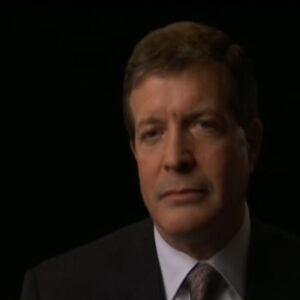Speaker I was a student at Harvard back in 1940, and I would come down to Pamela for piano lessons with Olga Samarra, who was the great piano teacher of the time. And I was an I was an oddball situation to have a Harvard student in her class. So I was not a Juilliard student. I was just on the periphery. But of course, I had some of my lessons at Juilliard. And then Juliette. Her pupils were my friends. So that’s how I pressed my nose against the window of Juilliard by studying with Samarra. But then she wanted me to come to Juilliard after that. But I was drafted early on in World War Two. And after I got out of the Army five years later, I came to New York and was introduced to William Schumann, who had just become the president. And it was sort of love at first sight. The electricity was fine and he hired me for Juilliard. Samarrah life was very important in getting that job. And I was to come in the fall of 1948. And part of my duties would be her assistant in piano teaching. But she died in May of 48. And there I was on the Juilliard faculty. But no, Samarra’s off to support me. And this was an exciting time, of course, when William Schumann took over because he was reworking the whole structure of Juilliard, the whole educational plan. And that’s when the literature and materials thing began. And with my musicological Harvard background, I was an ideal candidate for that.
Speaker Tell me a little bit before we get too far, what was older, like be?
Speaker Well, she was a queen. She was a great lady.
Speaker She was the career maker. And that’s why everybody born, every pianist won to study with her. She had developed people like Rosalind Turek and Eugene List and really Capelle, who was my contemporary. She had connections. It wasn’t that she wasn’t. She was a great musician and a fine piano teacher. But the really special thing, her connections with conductors, with managers, with wealthy people. And her master classes weren’t really master classes at all. They were grand parties where the students had to dress up and the boys in black tie and the girls in evening dresses. And we would play for this distinguished audience and there wouldn’t be criticism of the performance. It was a real audition for these important people. So it was terrifying and wonderful. But that was Samarra. It was an atmosphere, an aura shared her great apartment. At that time on Fifth Avenue, and she had a limousine with a chauffeur and butlers and maids and champagne was served. So that was Olga Samarrah off.
Speaker So she was so so we thought it was a rather sophisticated world. That’s the word.
Speaker Yes. We’ve introduced her real New York and international musical life and social life. And she would send her students to the Metropolitan Museum or take them to the opera. I won’t mention some of the famous cases, but she some of them, she took into her home and she would teach them how to walk and how to dress and.
Speaker So, yes, she really opened doors.
Speaker What was what was what was the reputation of Juilliard?
Speaker Well, at Juilliard that time was the Juilliard Graduate School. It was a very small school. All scholarship. So the cream talents were admitted. It had a building adjoining the Institute of Musical Art. And they shared up in Claremont Avenue. Hundred and twenty second. And Broadway. They shared library and auditorium facilities. But they were separate schools. So. And Juilliard was a very, very special.
Speaker And when you say it was sort of created with very much. That was it was variably.
Speaker Yes. Because it had wonderful small faculty of famous names. Well, in piano, you had all this tomorrow. Ernest Hutchison was the president at that time and he was also a famous, influential piano teacher. And people like Joseph Ambrosino, Lavie and Carl Freedberg and all these hundreds of Lotti James Frisk. And that was about the faculty. And there were only a very few students. I don’t know the number. I know one Samarra’s class. She had about 10 Juilliard students. She also had a kind of a farm team out in Philadelphia, the Philadelphia Conservatory. And she’d sort of take students from the Philadelphia Conservatory and eventually some of them would be brought into Juilliard. But getting into Juilliard was very hard. But it was Kintyre in the performance audition and the emphasis was entirely on performance. There were a few little classes, but they didn’t amount to much. Juilliard and graduate school didn’t give degrees. When William Schumann came, the two schools were united, and that’s when it became more of an academic institution.
Speaker And philosophically that time, were you aware of the differences between the eye of a God? I mean, were they to.
Speaker Yes. How were the two different? How are they different?
Speaker Well, the Juilliard graduate students felt superior. And the Institute of Musical Art. I didn’t know much about it because I was just kind of in and out. But they had them. You can anybody can get into the institute. It was a music school. And so the level of performance all and the level I went to, the level of teaching was lower. But it was the elite and the hoi polloi. The peasants.
Speaker And when you when you came back as a teacher.
Speaker Can you sort of describe to me that that was really just just at the merger? You know much about how the merger came to pass?
Speaker No, I don’t. Because I think that happened about nineteen forty five. Forty six. I don’t know who was economic or. And remember that this flood of music students coming out of out of the army, the G.I. Bill. And so I guess it was necessary. I’m just guessing. I really don’t know. But when I came into Juilliard, it was the Juilliard School of Music at that time. And there were about 700, 750 students. So those are about 200, 25, 250 pianists, which was quite a change from before the war when. No, just maybe 20 or 30 or maybe 50 piano students in Juilliard Graduate School.
Speaker And what was what was the environment like? The Juilliard School of Music? Oh, I mean, what was it? What was the day like there? What did it look like when you got to walk?
Speaker Well, it was exciting because William Schumann was young and full of ideas and he brought in a lot of new faculty overall in their 20s and 30s and even creating something new. Naturally, some of the old guard teachers, I think most of the institute teachers were captured and gradually many of them disappeared. But the first year I came, they were experimenting. The Juilliard year was to be a five year course starting at the college level. Well, he didn’t call it college, but college age students. And the idea of the third and fourth year being the piano pianists were to specialize in piano literature, which was something that hadn’t existed before. And a year was divided into two semesters. The first semester, the piano students were to concentrate on the courses and course they still had lessons. But the concentration was much more intense work in the piano literature courses. The second semester, the concentration moved to the actual piano lessons that didn’t work very well. But that was the first year experiment I remember. And so we who taught the courses and this wasn’t just a piano, was then the vocal literature. And they had the string literature and all of these special things. But the first semester you were very busy teaching courses. The second semester was a little more relaxed. You go off on tour, you could do things away from Juilliard. The salaries, of course, were just unspeakably low. And I am told there was some condition in the Juilliard will. The trustees had to decide and there couldn’t be any fund raising. The original grant. I think it was something like 20 million dollars was supposed to take care of the Juilliard School for all time. And so whether William Schumann’s hands were tied in the fund raising matter or whether it was just his way of doing things. I know I came there. My salary was four thousand dollars a year, which was more than some of the. He brought me from the Middle West. And so he considered moving expenses and all the major teachers as these people who were teaching piano or a violin. I think for paid by the hour. I know that Rosina Levine, who by then was the top teacher, was getting fifteen dollars an hour. Well, in those days, remember, that’s over 50 years ago. It wasn’t a living wage, but you were encouraged to take a job, a secondary or a tertiary job someplace else, or play concerts or do whatever you could for additional income.
Speaker And what was what was the building like?
Speaker Well, all the students need a little time. No, no. Different to. Well, of course. Haven’t you seen the building up there at Manhattan School? Is there. I always thought of what we thought was very glamorous.
Speaker It was two buildings, actually. The Institute, as you face it. I’m Claremont Avenue was on the left hand side. I may be getting this backwards, but they were two quite different architectural creations. And then I joined a. the library. As I say, it was common to both buildings. But the students know it looked like students. Nothing special them. And life was kind of freewheeling.
Speaker And was it was it was a very studious even then he was with the environment very well.
Speaker Studious is not the word I would use. Intense concentration on your. Well, in the case of piano. Yes. They practiced 24 hours a day.
Speaker Let it get a little bit about about about Juilliard as a kind of.
Speaker How do you think it fits into the world of.
Speaker Music education in America now, I mean, what do you think it’s the vision of it has been your time?
Speaker Well, yes. When I was growing up in Indiana in the 20s and 30s and Judy, I was still a magic named Juilliard and Curtis were the two magic names. They were rather similar because both schools were small and complete, full scholarships and had distinguished faculties. And there were other independent music schools like Peabody and New England Conservatory. I wouldn’t say they were quite as glamorous, but Juilliard and Curtis were rather comparable and they were the Mecca for a really serious performer or composer.
Speaker And what and how do you think they I mean, now they’re they seem quite different to me.
Speaker Well, they are. I think Julia Curtis has remained, as I understand it, small school.
Speaker What do you think that it was about Juilliard that made it through to grow into this larger?
Speaker Well, that’s has to do with William Schumann. And when he came in and I really can’t answer that.
Speaker We’ll talk a little bit about about about you. And obviously, Schumann himself. The man with someone.
Speaker Oh, boy. Yes. About dynamic. Do you think his name also could.
Speaker There’s no. My voice never appears in the movie. So if I ask you about William Shatner and you want him to say his name.
Speaker Well, of course, I love William Schumann because he was awfully good to me. He hired me in the first place. I was a little nothing from out in the sticks, but it was just. He did a lot of this on instinct. There were other people he brought and he just felt that they were right. And the Schuman’s lived in New Rochelle. And I came with my family not knowing where to go. And they turned me over to their real estate agent. Truman had the idea that his faculty would be a kind of colony around him and they were great. Many of the new Juilliard faculty that lived out in that same area and the humans but have us for dinner.
Speaker And we were a jolly group. Gradually, everybody disappeared. The Schuman’s moved away. I’m about the only one left out of that, but that’s why I’m in Larchmont. But both William Schumann and his wife Frankie were just marvelous, warm, welcoming people and. I’m somebody who really enjoyed working for. I know, though, I’m going to ask him for a raise from time to time. I never got a raise or rarely, but I’d go out of the office feeling I loved him even more.
Speaker But he he was full of these original ideas. Of course, Twentieth Cent new music was something that hadn’t existed in the old Juilliard tradition to a great extent. So a lot of composers were brought in. But the whole faculty that he brought in for the literature and materials, which he and his colleague Norman Lloyd kind of piece together a were full of marvelous creative people like well, Schumann himself is a fine composer, William Burgs, Merv, Richard Franco Goldman, Peter Menin, who eventually became the next president of Juilliard. And we’d have these meetings all the time to create this new program. Have you seen the book, The Juilliard report, which after a couple of years are doing these courses, creating these courses? We were supposed to write each of us a chapter of what we were doing. And so this book came out, the Juilliard report. It isn’t very interesting to read now, but if you’re doing this research at something you should look into because that gives you a picture. We were encourage each to do our own thing. And the idea of the literature materials was stripped away with textbooks. The old counterpoint theory textbooks were supposed to work from the music. And so we were it was the other way around. Instead of using the textbooks to analyze the music, you looked at the music. And you did your own analysis and your own ideas. And some of our ideas were lousy. We experimented.
Speaker And what was the what was the real what was sort of philosophically what was he trying to do with the school that something like the program would have represented? What was he?
Speaker Well, making musicians first of all, look at the music. You see, there had been too much emphasis on just kind of routine learning by rote. That’s really not the right picture to give. But instead of bringing outside things to bear.
Speaker No, it was working for me from the music itself out.
Speaker And that’s a tough one to answer.
Speaker Well, really, if you think that it was once, you know, before you came, perhaps, you know, if not directly this sort of European based, almost like Pentagon, that’s all. That’s right. Was he trying quite hard to sort of create a different American model? Was he really trying to change that? Yes, I thought maybe. I think exactly. That’s.
Speaker No, that’s exactly right. And brings him I’m I hate to use the word academic, but more things, more academic ideas with music.
Speaker Now, at first, Julia, I wasn’t giving degrees. It was this five year course. Then somewhere along the line, about 1950, they were able to give Bachelor of Science degree. They started giving degrees. That meant that there would be this this whole aura, this whole cornucopia of theoretical courses and academic courses.
Speaker And then about 1950, 51, they added a graduate level. So the master’s degree and then a few years after that, the doctor’s degree sort of became a university.
Speaker The idea was that musicians had known enough before and now they were to steep themselves in history of music.
Speaker So languages that we feel would be interesting. I mean, maybe since I said it, maybe you could tell.
Speaker Tell me back a little bit what you know, what the school had, that the school had been this kind of this kind of much more refined, almost close.
Speaker Yes. Tell me a little bit. And then when you came in that philosophically, he really wanted to open you up in a way he was looking back to sort of down Russia’s original vision, if you’d ever read early stuff about Damrosch.
Speaker But, you know, no, I haven’t. Yeah, it’s OK.
Speaker But it became more like a university with this academic side to it.
Speaker Was there. Was there some effort? Was there some kind of element that was a little bit afraid that he was making it in the ways that democratic.
Speaker I’ve been I’ve. With it. Was there opposition to Schumann? I’m not going to do this.
Speaker Yes, indeed. I was part of the excitement because our whole factions who were on the faculty and certainly among the students, probably among the parents, the outside world objecting to this change. And some of the people who had come from the old Juilliard Graduate School or the institute quit.
Speaker So a few marvelous people on the piano faculty left after the first year because there wasn’t enough time for the students to practice, for instance. And there are people on the theory, the company, the literature materials faculty, who objected violently. Of course, this on the students. And while these extra courses they went to practice. So, yes. Or palace revolutions and groups meeting in cellars, we to get rid of William Schumann. When I know you better, I can tell you some of the work. What happened?
Speaker But, you know, of course, I always say this sort of visionary. I mean that. That’s right.
Speaker I think we would. I would. I read them. That’s what I would get away with that in a way.
Speaker He he really encouraged the sense of knowing about life and life and music.
Speaker Exactly. You know, maybe we could talk a little about. Well, you said it.
Speaker Well, I hope I’m not I can’t take it.
Speaker Well, we can’t say that William Schumann did this single handed. He came from Sir Lawrence. And you know that we’ve had advanced educational ideas back in the 30s. And his colleague there, I mentioned Norman Lloyd, was the dean of Juilliard. Which one brought him the two together were kind of the the originators of all these ideas. But then the people that came in later, I mentioned some other names like, well, Richard Franco Goldman, I remember who was a brilliant mind and brilliant musician. Everybody sparked everybody else in creating this whole new curriculum.
Speaker And what would you tell him about the literature and materials of music as being a series of sort of courses or a new way of looking at the music?
Speaker But you knew in what way from from any.
Speaker Well, the absence of textbooks, you see, that was the first thing apparently in the old institute. I say apparent because I wasn’t there. Really shouldn’t ask me about things that I only know second hand. But there were books on counterpoint, books on composition and rulebooks. And this is the old European tradition in conservatories. And there was room with literature materials. That’s where the name came from. You studied the musical literature and the materials, how a piece of music is put together. Now, the way it was set up, the first five years, the first year I was there and there was a five year course. The first two years were devoted. The students concentrated on composition counterpoint. But there was no textbook. And the teacher had to each teacher, handle that differently. There were some people like Vincent Percy Keddie, who were marvelous and imaginative there. Some other people left over from the old regime who still want to go back to the textbooks. And so this was kind of a hodgepodge. It was all mixed up for. And for the students, rather confusing. Then the third and fourth year, the students, as I said, concentrated on their major interest, the piano literature or the vocal literature or the spring literature and so on. Then there was the fifth year where there was a great course in music history which was supposed to bind everything together. I was taught by a wonderful man, Robert Tanjim, in any way.
Speaker After that, I can’t remember how long the five year program lasted. Not very long because. But every year it would change and we’d all tried different things. My approach, since I was just trained that way at Harvard was the chronological approach. So I would start with early music, sixteenth century, 17th century keyboard music and get as far as Mozart. And then the second year I would go on from Beethoven to the 20th century. And some years I tried to do it backwards and start with 20th century and go back. I remember my first day of teaching here. I was scared stiff going into this class of young virtuosi. And I sat down and I played a piece of the 16th century, 17th century English virginal composer John Bull. And then I turned to the class and said, Now what is peculiar about that?
Speaker And one of the students said, You’re pedaling. I almost threw myself out of the sixth floor window. After that, there was no place to go but up.
Speaker Well, it seems like, you know, there is a level of the student at Juilliard. Still, I mean, you’re. Oh, yes, people. But I’m always quite interested. We’re following a little eleven year old violinist who said she’s an unbelievable player. But I mean, in her case, she’s a child. You see the theory.
Speaker She says, oh, so I can’t do this sort of instinct. So in a way, studying these things is quite well.
Speaker Things have changed since I’m talking about 50 years ago now. And the literature materials program has well went the way of all flesh because textbooks began to be written about the literature materials program. I don’t know what they’re doing now. First of all, I’ve retired from the school and I’m when I was doing the piano literature courses all these years, it became kind of a little empire of its own. I was neither flesh nor fowl. I was not part of the literature materials program and I wasn’t part of the piano faculty that way. I was just there. And as I say, all the students had to take my courses. So I heard knew all of the students who majored in piano, least starting from their third and fourth year. I think Owen also changed in the last few years. I was there. They began. It turned into a three year undergraduate course. They started in the second year.
Speaker But I can’t speak for what the literature material. I don’t even know if they use the name now. Do they still? Well, that’s.
Speaker Yeah, L.M..
Speaker Talk a little bit about about New York at that time.
Speaker You know, politically. I mean, Giuliani is sort of in this in this sort of hotbed, you know, New York 1950s post-war euphoria in New York. I mean, it was voted in.
Speaker Well, to me, New York has it really out the door.
Speaker Yes, I can understand that because I’ve lived here for since 1948 and it’s still exciting. And I hear about Juilliard students now. They’re at Lincoln Center in the middle of New York, the beating heart of everything. And they shut their doors and don’t go out. I can’t explain that. Too bad, because I think you were asking me earlier about what made Juilliard so special in its location as well. One of the things that makes it very special. You’re here now. You’re at Lincoln Center, and all these opportunities to hear music can go to theater and run around them, see Central Park.
Speaker And were you did you did you notice when you were there? You were there through some very political times.
Speaker I mean, did you did you have the music that you used to respond to the real world?
Speaker Well, the time of all the student uprisings and things at Columbia. So there was a little bit of that. I’ve been very little. I can’t explain why, except that I guess musicians aren’t most musicians aren’t politically oriented. No. It was a kind of little closed enclave. And Chris, I don’t know all the things that went on, but I know there were no great demonstrations, I think, at one point during the Vietnam demonstrations. A group did meet in Lincoln Center march around or something. But no, there was nothing drastic.
Speaker So I think my dad actually Vietnam War, a lot of the faculty, a lot of the students, the drama as well.
Speaker And they’re very coarse drama started much later remembers. It was a seed when we were still up at Claremont Avenue. We moved down to Lincoln Center in 69 and there weren’t any drama students. I don’t think, until we moved down there.
Speaker Talk to me a little bit about some of them.
Speaker Well, the Juilliard Quartet, again, was Bill Schumann’s idea and happened. I think a couple of years before I arrived.
Speaker But the creating of the Juilliard String Quartet. Thought was a historic landmark. The dance department that went didn’t exist until about 1950, 51. And that was glamorous because of everybody. Every important person in the dance world was on the faculty. You’d gone to the cafeteria up at Claremont Avenue and see Martha Graham standing in the cafeteria line holding a red rose to see the fish. And it was Anthony Tudor and Doris Humphrey, everybody. It was very small and it was a wonderful woman, Martha Hill. You’ve probably done some work on her, haven’t you? Who in her way was just like William Shiu mama. That was another friend of his from the old Sarah Lawrence stage. And then the drama started, the drama division that began, I. D I think began around nineteen sixty and it didn’t really function until, as I said, we moved down to Lincoln Center and there were there were annual festivals. The first year I came they were doing whole festival of French twentieth century French music and then they did an American festival and they commissioned works from important composers.
Speaker Almost every year was a landmark.
Speaker And what you were talking about, the cafeteria, a lot of people have talked about. What was it like the meeting between the division once the dancers came in, in 51? I mean, in the 1950s, was there a plan?
Speaker Well, there were so few of those. It’s hard. I think there certainly are so few dance students. Certainly the faculty mingled with whoever you want to mingle with. And after all, there were great feuds in all the faculty among the piano faculty, there were feuds. And so some people on the piano, faculty members would sit at one table and the other group would sit over there. That’s a whole fascinating subject, too. But we won’t go into that.
Speaker Oh, look at what what, what, what, what to the majors, the big Juilliard. What kind of music?
Speaker No. Well, it is usually over students, college students, changing teachers or one student winning a competition over another student. Well, that was something else that was starting when I first came in. Never had been appearances with the Juilliard Orchestra, but they were done.
Speaker A teacher was just asked to select a student, but then they started the idea of competitions for appearances and that turned into all sorts of interesting situations. Juilliard, I know, has had this reputation of being I mean, being very competitive. Well, that’s true. Probably always was, even before. But this sort of highlighted the competitiveness and competition took place between the teachers over who would get certain talented student. But after all, the world is competition and certainly the musical world is so well, I know it’s heard a lot of people, a lot of students to be there and they complain, but it prepares them for what’s going to happen when they get out.
Speaker You mean, in fact, were the world at Juilliard and just got A mere or B.
Speaker Exactly. Below that. What’s to come?
Speaker That’s right.
Speaker Maybe a heavier blow because it’s more concentrated, you know, with no.
Speaker When Dick Cheney when the presidency changed, when it went down to Lincoln Center, then Sherman ultimately went to Lincoln Center. Talk a little bit about how the school changed. In fact, I think even tell me how that how that whole decision came to pass, that he would leave.
Speaker Well, how can you turn down something like this? First of all, there was the decision when Lincoln Center was created. We’re going to have a school and I think there were several schools that were being considered. I think Juilliard was given the first option. And the decision had to be made whether to bring the school down. And that was humongous decision. He lost his left in 1962. And Peter Menin became the president. Of course, the school changed dramatically because the physical plant. This was so glorious.
Speaker The one up in Claremont Avenue was a wonderful kind of old fashioned conservatory, and it worked. But the neighborhood was beginning to deteriorate. That was one thing. And to come into this wonderful new building. So the atmosphere changed physically. And Peter Menom was quite a different kind of personality than William Schumann here, man. And was more. Was much better fund raiser. I think by that time, the business of fund raising reared its head and it could be done. And Peter Men was quite good at that. The school began to get more money. Peter Mannar was very good about increasing the salaries of. As an administrator, he was more removed and his dean, Gideon Waldrup, was kind of linked to the faculty.
Speaker So we prospered during them men and years, but it was you couldn’t just wander into his office and sit down and chat where you could with William Schumann.
Speaker So in a funny way, it’s almost it makes me feel almost like it was a co-operative. It was like a cooperative in the Shimon years. Yes. And then became more of an institution.
Speaker That’s a very good analysis of it. And of course, when we moved to Lincoln Center, again, the drama department came out. And of course, at first your class at that from the drama school of people like. Well, Kevin Kline. Who pawn David Ogden Steer’s. I remember. I think I just think Robin Williams came a couple of years later, but they were a separate entity. But still, you could feel a kind of electricity with in the elevator with people like that in the productions they put on were already great. John Houseman of his running mate. And of course, he was a marvel. And the dance division got bigger and bigger and well, that’s something else that changed many more real public events like the Free Wednesday noon concerts for the neighborhood.
Speaker Why do you why do you say John Houseman was really a marvel?
Speaker Well, again, this is from the outside looking in. He really developed the drama school and was a personality. That’s all I can speak of socially and the results socially because he was just such an imposing. Exactly character imposing but warm underneath that glacial exterior. Well, you’ve seen what is it, the Paperchase, that movie. I think he can’t macadam me award for it.
Speaker Talk a little bit about the educational outreach know you were involved in. Oh, yes.
Speaker What became that program? You talk about that? Well, that was that mission.
Speaker The mission was all right to start cutting you off.
Speaker Well, the mission of this outreach program, I know the personnel, the people we got, Mark Schubert was in charge of it. And it was a wonderful woman named June Dunbar and me. And we got a group of about 10 musicians, not all of them young musicians. Not all of them were from Juilliard, but were composers and performers and dancers. And the idea was to send them out to the public schools all over. And it was the beginning of what became the Lincoln Center Institute, which Mark Schubert became a separate branch of Lincoln Center. Mark Schubert ran that. But gosh, we’d go out to these Third World schools and some of it was terrifying and put on programs and read reviews, then other Juilliard students as performers in these demonstrations.
Speaker And what was your sort of philosophy behind that? It was an obligation of an institution such as.
Speaker Yes. I the idea of Juilliard not being such a closed institution but was going to give to the community. I don’t know how this was funded, whether Juilliard did it or whether the city did it, but it involved, of course, all the public schools and therefore the municipal school system where the private donations.
Speaker Well, you know, still exists in the form of even the community service, having kids go out and hire anybody, even just to play hospitals hospital.
Speaker Yes. Though I don’t know what the timeline was there, because Mark Schubert then became the head of his Lincoln Center Institute. Have you heard about the. Yeah. And it did the same sort of function. But now I know Juilliard is doing more and more of that. I think the Irene Diamond Foundation is funding some of this.
Speaker Why do you think it’s so important? I don’t know.
Speaker Well, it’s important because the arts, the performing arts themselves are important. And if the schools, the public schools, the public school system is not doing that on their own. And as you know, music in the public schools is the first thing to go when there’s a budget cut. So it’s terribly important to make the young people aware if you don’t start when they’re in the elementary schools, they’re not going to be an audience. They’re not going to have the advantage of knowing of enjoying getting something out of music and theater and dance. And this the idea is to create an audience and add something to their lives. Music. When you’re performing, it’s a great discipline, too. And some of them will go into that just as a mental physical discipline.
Speaker Well, the world the world of the arts has really, really certainly changed the acceptance of classical music. I mean, you feel that the times that you’ve been teaching, you’ve seen the reception, the audience really change. Have you felt this be part of this need to reinvigorate me?
Speaker Yes, that’s a problem. Well, classical music, of course, is in a bind right now. When I came here right after World War Two, there was this great burst of interest in classical music. Symphony orchestras were more of them were being established and there were millions of concerts in New York City and there was no seven newspapers covering these concerts. Now, just speaking for piano, the piano world has shrunk. I think the great flowering of solo piano recitals has certainly diminished. Whether it’s going to come back, I don’t know. Van Cliburn was a very important figure in that. Just the fact of Van Cliburn in 1958, winning the Tchaikovsky competition and having a ticker tape parade and being a person with a great sense of public relations, he speaks well and he knows how to behave. So he became an icon and encouraged young American males to study the piano. Before that time, American male pianist was considered kind of offbeat, not really an acceptable profession, but Van Cliburn. And what followed made it respectable. And so you had all these opportunities for pianists, solo careers. But now I don’t know why it shrunk, but it certainly shrunk. Well, I think Juilliard now is showing that because when I came, as I told you, there were 200, 250 piano students. That’s about a third of the school. Now, I understand they’ve limited it to one hundred and twenty. They’re gradually cutting down on the number of pianists you’re accepting as students because there’s no place in the world for the. There is this idea that the grass is greener in Asia or in Europe, but of course, I’ve been these places in Asia, all the Asian countries and in Europe, they all want to come to New York and come to Juilliard because that’s so it’s a sad situation. I know it’s television, too much exposure to serious music. I understand the recording industry is having troubles, too, with serious music, but it will change. But I’m glad I got on the scene when I did. I would hate to have to try to make a career as a pianist now.
Speaker What do you regret doing that to me? Tell me a little about Rosita Jones.
Speaker Well, I never knew Joseph. I had known I studied out in Indiana with a pupil of the Levene’s who was supposed to be the most talented student demand in Bull Ma Kramer. And he Levene’s would come out and do masterclasses. I Mythili Viens van. And then later on Colorado, where they used to come for the summer and Joseph died, I think it was 1944. So I didn’t really know him. But Rosina and I were great friends. I’m sorry I was never her pupil, but I would play for her when I got here and. Well, she was a marvel, a great lady, and we lived in Larchmont and she would love to come out to Larchmont because she could walk in the park by the Long Island Sound and she would call us and say, Oh, so-and-so in Scarsdale invited me for dinner. Could I come out to you for lunch? And then she’d call so-and-so and Scarsdale seven blocks and invited me for lunch. Can I come to you for dinner? That was Rosina. And it was always a great operation to come in and get her because she didn’t like draughts. But it was a you enjoyed waiting on her. And I knew when I played for she had this knack of knowing exactly what was wrong. Just a few words and hitting exactly the right spot. It was a genius. So, yeah, that was a very special character. Van Cliburn was in my classes and I’m famous because I flunked Van Cliburn. Well, like John Wilkes Booth, Van Cliburn, when almost from the moment you came in, Juilliard was taken under management and was on tour constantly. So he’s was hardly ever there and he’d hardly ever show up for class. And I’d leave the house to drive in and eight o’clock in the morning and the phone would ring and he’d fifteen my wife and answered the van with the block. This is a van. I’m so sorry. I just got back from touring and I’m so tired. Would you tell Mr. Block I’m so tired. He was such a sweetheart. He still is. But he didn’t show up very often, so I had to give him insufficient attendance.
Speaker Oh, I’m very sensitive.
Speaker That’s good. Rosita, just visually with Clyde, I’ve only seen photographs. I describe her physical.
Speaker Well, she was short and a little. I think what better word than chunky. But, you know, it’s solid but and always immaculate, beautifully dressed. And I’m hesitating because she had this wonderful wigs. That’s all right, isn’t it? I don’t think it’s a secret.
Speaker And she was above it all.
Speaker The whole Rosina story is wonderful because when Joseph died, I guess it was a great problem. He didn’t have any insurance or this was during the war in 1944. They had a big house out in Kew Gardens and she had to give that up. She moved in to a one room apartment with some students up there in Claremont Avenue. They put up a screen for Ruzena, she who had had this house and servants and all this elegance. And even after everything was settled and she became richer and famous, or she took another very small apartment up in Claremont Avenue. One bedroom part where she lived. She shared the bedroom with her old retainer, Sarah, of the loyal black lady who’d been with her for years. And then a student was usually there sleeping on the couch. She wasn’t pretentious. She was elegant, though. And at the age, you know, she was always practicing at the age of 75. For the first time in years, she came back and played in public. She’d kept her fingers in wonderful shape and she played a Mozart concerto up at Juilliard. That’s been recorded. It was so, so marvelous, just unbelievable that she got several appearances out of that. And for her 80th birthday, as you probably know. Leonard Bernstein invited her to play with the Philharmonic. And she did the Chopin E minor. Again, it was small scale, but these miraculous fingers. And so she’s a role model.
Speaker Was she a great player?
Speaker It’s hard to say. It’s a great play. What she did was beautiful. It was small scale. And she played some chamber music and she did these two concertos. She didn’t do solos that I know about. She would go to Aspen every year and also play. So you can’t say she was great because it was a small repertoire and she she’d been apparently a marvelous pianist back in her teens. But when she married Joseph, she and the two of them did two piano recitals, but she did not play solos. To my knowledge. But she was a great teacher, great woman.
Speaker And what she did was very beautiful. It’s quite made you live.
Speaker Well, that was of necessity to the students, though. It seems like these relationships were like they were family. That’s right.
Speaker Because there was always a student on the premises acting as an unofficial social secretary or maid of all work or whatever. She had several students doing that.
Speaker And and the subtle way of teaching it as you saw it over the years, you mentioned before we started about about Dorothy DeLay.
Speaker Well, there were some of these great teachers to be suddenly like they’re almost not teaching. John Williams is a student of Rossini’s and I don’t really recall her ever really telling me how to play this sort of. What is that method of teaching that? What do you do?
Speaker Well, I don’t know. I’ll guess tomorrow off was much the same way I did when I was only with her two years. I really can’t speak as an authority on Somare and my relationship. Since I wasn’t at Juilliard, I was a little distant, but she’d had a summer place in Maine, which she would take a selected group of students. She would take a select group of students to Europe. It was a family and I think with Ruzena also this great maternal interest. Trouble is, it didn’t extend to all the students. I know Somare of played favorites. I know Rosina Levine played favors. We even talked about Adele. Marcus was that’s another colorful character in the Juilliard faculty. It was the same thing. August Somare, for instance, never demonstrated anything at the piano, and she’d make all these allusions to literature and painting and so on. It was very poetic. And my music is full of things like mood of mystery. But she couldn’t tell you how to do it. You had to figure it out for yourself. I think this close family thing is very important. And know days is too long. The students are the center of the teacher’s life. I’m your haven. Kaplinski is a good friend of mine. I admire her enormously and she’s done a wonderful job. I’m not I don’t know a thing about her teaching. I know she’s very sought after and I can only guess it’s because she spends so much time with the students.
Speaker And what is this sort of unique?
Speaker I mean, when you were living, you were studying piano yourself. I mean, are you are you looking to your teacher? Is that an all encompassing world? In a way, this world?
Speaker It should be. Yes, I think it is. I think at that time, can’t go on forever. I know there are some teachers who hang onto their students forever, and that’s unhealthy. But for that period of a few years, when you’re in your teens or early 20s, to have someone like this who believes in you and and some interest and not just your wiggling your fingers on the piano, but what you’re doing in the outside world is it’s a fine line that the teacher has to draw. You can’t get too involved with the students, but someone like Samarra, I think, did it right. I think Rosina is right. And I guess your haven is doing it right.
Speaker Well, yes, you talked about Adele.
Speaker Adele Marcus and also people have talked about Sosha gardening and Joe Ray was, of course, still there. So little way he has one now, but that’s. Yeah. But talk a little bit about I mean, of course, you roll your eyes immediately. When I said what? Let me go over the.
Speaker I’m trusting in your discretion. Well, you know. Yeah. I mentioned earlier we had great feuds there, piano family. And that Adele was a storm center and Sosha had a very long and drastic feud. I think it all started. You ask why earlier over a student of one changing teachers going to the other. And I know Sasha and Adele did not speak in the school, was very clever about four examinations, putting them in separate rooms. Irony. I remember in the old building down Claremont Avenue on the fifth floor where most of the teaching studios were, such as Studio One and in the men’s room, was at the other end by the elevators. And so she would come out of his studio on a Fidele Marcus standing in the hall between him and the men’s room. He would not go down the hall. He would walk down the stairs and climb up the stairs on the other side so he wouldn’t have to speak. So that was all kind of fun. Well, IDL was she was my very good friend, but she was a very tactless and acid tongue lady. So she made many, many an enemy.
Speaker But it seems like it would not do any good. Get people get fired and not too many people retire. Sort of like with you. I mean, I was actually Vayda convinced you told me that when she was signing her contract, it asked what what you plan to reply.
Speaker That’s something new. And she went around and she asked people. They said, oh, just write never. You have to go out of here. But you’ll never know.
Speaker In the times I was there. There was no retirement planning or Ruzena lasted there. And I think she was 96. But of course, the last years were not so great. Now, Juilliard has always been very humane. I’m not sure it’s a good idea necessarily. And some of these people drag on and being fired would only be for the most extreme circumstance.
Speaker Do you think the European model of training know the early years of the conservatory life in Europe have different with it?
Speaker Well, I don’t know. I only read books about that or hear about that, so I can’t answer.
Speaker But do you think the book. I mean, what what’s the myth? What’s the myth?
Speaker Well, you know, the novel John Krzysztof, for instance, by Romell, it’s about a musician going through school and gives a picture of conservatory like that was written at the turn of the century.
Speaker And it’s as it describes it, it’s probably like the old school yard where there weren’t any bar.
Speaker It was hard to get in, but there weren’t any barriers that were in courses. You sat and you worked hard at your instrument or to avoid something, went around and had a nice city life.
Speaker Did I? Well, I’ve always found it interesting when I look at the photographs that truly are always at the time was, you know, there were always women admitted. There were always people of color admitted. I mean, in the 50s and Juilliard, when the rest of the world was quite segregated.
Speaker Did you did you have that in there of a kind of an artistic blindness?
Speaker That was that was really no open because there were a few black pianists came to the school. Very few. And of course, when the Asian students began, that was of course, they were unusual and exotic, but that multiplied. But and certainly there were plenty of women. So, no, I think the arts generally are very good.
Speaker What is the word I want to open accepting everybody? It’s the talent that mattered.
Speaker They are quite original. I mean, there were some incredible composers. I mean, when did that all sort of begin to strengthen in your mind?
Speaker Well, again, that’s not quite my world, but to a yard always had a composition department and always had interesting composers as students going through. Everything was smaller back in the thirties, in the early 40s that enlarged since Schumann himself as a composer. And I think he was the first president or Juilliard who had been a composer. And so that was a central interest for Schumann. But he brought into all these marvelous people with young people so that the kind of composition changed. And there was much more interest in commissioning works from outside composers. I know. Then you had an intimate festival just before I came, and he said, well, every year we’d have distinguished visiting professors, but someone like, well, Schumann himself a composer. Vincent Percy Ketti, I mentioned. We’ll meet Peter Men and was William Bergsman. These were all the young Turks of that particular period. And then, of course, eventually we had people like Elliott Carter and Roger Sessions and David Diamond and.
Speaker Yeah, and I’m not one Babbitt.
Speaker And then one of the one thing that I did, I’ll just have you make a small note so that I can somehow cut you this incredible number of pianos at Juilliard. Incredible piano repair department I’m so impressed by. I mean, how many pianos?
Speaker It’s 200 and something you’ll have to ask Mr. Twombley Tor, who’s in charge of that. And I don’t know. They’re all Steinway’s. So there is some kind of family connection. I think there was has been one Baldwin because Adele Marcus was a Baldwin artist and I think she may have brought that in if it’s still there or not. But no, that’s. Yeah. Juilliard is very lucky. And all the students complain or all the faculty complain that the pianos, the condition isn’t always right.
Speaker But, yeah, well, it seems quite elaborate.
Speaker One building in New York.
Speaker Is that what it is? 20 something.
Speaker I mean, pretty well, a music school, a good music school has to have good pianos. Some of them have other pianos. I don’t know what Manhattan or Venice have.
Speaker Let me give you one last question. Is it. Let’s listen in. All right.
Speaker First to you.
Speaker I mean, other very important things that you feel you haven’t discussed.
Speaker I can’t even remember what I’ve discussed.
Speaker Well, I think basically, you know, we’re following again piano student now.
Speaker Which one do you feel that? What’s your name? You say Elizabeth Morgan. She’s from Berkeley. Whose pupil is she? She’s a vet. She’s a pupil.
Speaker And, you know, she’s been talking about when we’ve seen her practicing just in a room.
Speaker I mean, do you feel in a way that this this journey of a pianist is in a way mirrored over and over? I mean, do you feel that there’s a commonality always between someone setting now to be a pianist and somebody and you yourself studying? Is it is there sort of a journey that can be.
Speaker Well, my background was so cut up and checkered because it was university and army, and so there were all these interruptions. I never unfortunately had that experience of several years just sitting there in a practice concentrating. I went to the Chicago Musical College before I went to Harvard. So that was probably the most intense, concentrated practice period. But I think that’s just my life. It’s very important to do this intense in the studio, practicing for hours at that age that you describe Elizabeth Morgan, because you build up the physical reflexes and the mental attitude and you build up your repertoire. That’s the thing that I regret most. I was in the Army for five years at a time. My early 20s, when I could have I should have built up a bigger repertoire. So I’ve suffered from that.
Speaker But in a way, it’s a very lonely road. Yes, that’s true.
Speaker I mean, maybe music is lonely and then you share. Mean there has to be a period of long, right?
Speaker Well, I can’t analyze that. Some people manage it. And some people don’t. But still, at my age, is the satisfaction of sitting down and and playing. You feel better physically. Clears you up emotionally. And of course, it’s wonderful mental stimulus to still try to learn a piece of memorizing.
Speaker So that’s a necessary phrase, there’s nothing no way to substitute anything for it. What day year is this? Elizabeth Morgan and she and under third year.
Speaker It just seems to me that it’s it’s interesting with the musicians there more than the actors or but that, you know, musicians are very shy, quiet people, and then there’ll be a whole different person when they go.
Speaker It’s really lovely. I love that part of it. That’s that’s sort of that world of expression that I know nothing about because I don’t play an instrument. But it’s I mean, did you see that over and over again within students?
Speaker Well, they either have it or they don’t. If they don’t have this joy of getting up and playing in public, then they’re in the wrong profession.
Speaker If you’re content to sit for the rest of your life and play for yourself, then at your private hobby, your private pleasure. But ultimately performing is communicating. And so you have to.
Speaker And that’s where Juilliard is marvelous because there’s so many opportunities within the school. Now, all these orchestras, all these chamber groups. Chamber music wasn’t even required. Back in the good old days from I started there, all these public concerts give the students the opportunity to seize the focus festival.
Speaker Well, it gives people a chance to not just play together.
Speaker Oh, yeah. Yeah. And more and more, as pianists have to be able to do this, the idea of a solo career alone is just nonsense.
Speaker Some people there are a few that may have this quality, but it kind of freaks like an actor who’s just a star. You can’t describe where it comes from.

